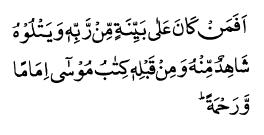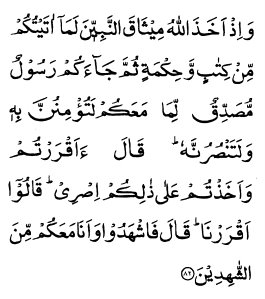
Muhammad is not the father of any of your men, but he is the Messenger of Allah and the Seal of the Prophets; and Allah has the full knowledge of all things. (33:41)
Here the Holy Prophetsaw is called the Khataman-Nabiyeen, which is commonly misunderstood to mean the Last Prophet. In fact this term translates to ‘Seal of the Prophets’. Khatam, in Arabic, is used to denote a stage in excellence beyond which a higher stage cannot be conceived. It is an expression of superlative praise, and is always followed by a category or genre. In the Arabic literature numerous examples of its usage can be found in the sense of highest praise. More on that later.
This verse responds to an insult which was frequently hurled at the Holy Prophet: that he was not the father of a male child. It starts with acknowledging this as a fact. It then goes on to declare him the Khataman-Nabiyeen. If Khatam is taken to mean the ‘last’ then it is a strange response to the stated insult. When a defect is pointed in a person and the person is to be defended, then the defense can take one of two routes: either the defect is shown to be not really a defect at all, or an excellence is pointed in the same person such that the stated defect is rendered meaningless by comparison. Clearly this verse does not take the first line of response, which leaves us with the second. Let us assume for a moment that Khatam means last and see where that leads. It would mean that by not having a male child not only Muhammad terminates his ancestral line, but that he also terminates the line of prophets, which is God's supreme blessing to mankind. If the former was a curse as was alleged by his enemies, the latter compounds it further. How could such a defense uphold his honor?
Clearly this verse is in praise of the Holy Prophetsaw, and allows no other reading. While the enemy is occupied with throwing barbs at him at not having a male issue, Allah calls him the Seal of the Prophets; the one who is prophet par-excellence. As a seal, who not only certifies to the truth of earlier prophets, but by following whom highest spiritual stations including prophethood become attainable. What to speak of absence of physical descendants when one is the fountainhead of all levels and stages of spirituality. Furthermore, it connotes an abundance of spiritual progeny of the highest quality, which to be complete, must include prophethood as well. What an apt response!
In this light, Khataman-Nabiyeen establishes continuity of prophethood of the kind that is wholly subservient to Holy Prophetsaw. Like a seal that leaves its imprint on the surface it strikes, Muhammadsaw being the Seal of the Prophets becomes a prophet-maker. A distinction unique to him among all prophets.
This verse responds to an insult which was frequently hurled at the Holy Prophet: that he was not the father of a male child. It starts with acknowledging this as a fact. It then goes on to declare him the Khataman-Nabiyeen. If Khatam is taken to mean the ‘last’ then it is a strange response to the stated insult. When a defect is pointed in a person and the person is to be defended, then the defense can take one of two routes: either the defect is shown to be not really a defect at all, or an excellence is pointed in the same person such that the stated defect is rendered meaningless by comparison. Clearly this verse does not take the first line of response, which leaves us with the second. Let us assume for a moment that Khatam means last and see where that leads. It would mean that by not having a male child not only Muhammad terminates his ancestral line, but that he also terminates the line of prophets, which is God's supreme blessing to mankind. If the former was a curse as was alleged by his enemies, the latter compounds it further. How could such a defense uphold his honor?
Clearly this verse is in praise of the Holy Prophetsaw, and allows no other reading. While the enemy is occupied with throwing barbs at him at not having a male issue, Allah calls him the Seal of the Prophets; the one who is prophet par-excellence. As a seal, who not only certifies to the truth of earlier prophets, but by following whom highest spiritual stations including prophethood become attainable. What to speak of absence of physical descendants when one is the fountainhead of all levels and stages of spirituality. Furthermore, it connotes an abundance of spiritual progeny of the highest quality, which to be complete, must include prophethood as well. What an apt response!
In this light, Khataman-Nabiyeen establishes continuity of prophethood of the kind that is wholly subservient to Holy Prophetsaw. Like a seal that leaves its imprint on the surface it strikes, Muhammadsaw being the Seal of the Prophets becomes a prophet-maker. A distinction unique to him among all prophets.



